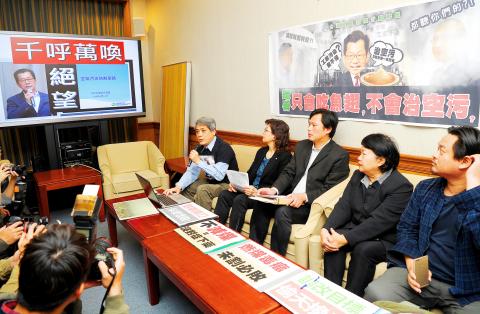The Cabinet’s planned measures to reduce air pollution lack focus and their goals have been “watered down,” environmentalist groups said yesterday.
The Executive Yuan on Thursday announced plans to earmark NT$36.51 billion (US$ 1.2 billion) for 14 pollution control measures aimed at lowering levels of PM2.5 — fine particulate matter with a diameter of 2.5 micrometers or less — by 18 percent by 2019.
“The measures they have announced are far too simple,” Taiwan Healthy Air Action Alliance convener Yeh Guang-peng (葉光芃) said.

Photo: CNA
Yeh compared the government’s strategy to applying a “one size fits all” approach to emergency patients.
“With regard to air pollution there are two Taiwans, so you cannot use national average values to address the issue,” he said, referring to the steep divide in air quality caused by the concentration of heavy industry in the nation’s south.
Even within individual cities and counties, government goals were “watered down,” as data from monitoring stations in national parks would be included in the averages, he said, adding that data from monitoring stations near traffic “hot spots” are excluded from the average.
The Cabinet’s plans are misleading, because some of the measures, such as phasing out aging steam generators, were launched under the previous administration, Yeh said, adding that the measures focused too heavily on regulating “peripheral” pollution rather than directly taxing vehicle owners and polluting industries.
“If the government is serious about addressing pollution, it has to make the polluters bear the costs,” he said, calling for direct taxes on Formosa Plastics Group’s naphtha cracker plant in Yunlin County.
Vehicle owners should also be required to pay additional fees on heavy pollution days, he said.
“Premier Lin Chuan (林全) announcing the Cabinet’s position would normally show political resolve in addressing the issue, but it is not enough, because they have yet to outline how they will incorporate our demands,” Green Citizens’ Action Alliance deputy secretary-general Hung Shen-han (洪申翰) said, calling on the government to hold consultations with environmental groups.
New Power Party (NPP) Executive Chairman Huang Kuo-chang (黃國昌) accused the Executive Yuan of failing to take a stance on the naphtha cracking plant and urged the Legislative Yuan’s Social Welfare and Environmental Affairs Committee to review his party’s proposed amendment to the Air Pollution Control Act (空氣污染防制法).

The manufacture of the remaining 28 M1A2T Abrams tanks Taiwan purchased from the US has recently been completed, and they are expected to be delivered within the next one to two months, a source said yesterday. The Ministry of National Defense is arranging cargo ships to transport the tanks to Taiwan as soon as possible, said the source, who is familiar with the matter. The estimated arrival time ranges from late this month to early next month, the source said. The 28 Abrams tanks make up the third and final batch of a total of 108 tanks, valued at about NT$40.5 billion

Two Taiwanese prosecutors were questioned by Chinese security personnel at their hotel during a trip to China’s Henan Province this month, the Mainland Affairs Council (MAC) said yesterday. The officers had personal information on the prosecutors, including “when they were assigned to their posts, their work locations and job titles,” MAC Deputy Minister and spokesman Liang Wen-chieh (梁文傑) said. On top of asking about their agencies and positions, the officers also questioned the prosecutors about the Cross-Strait Joint Crime-Fighting and Judicial Mutual Assistance Agreement, a pact that serves as the framework for Taiwan-China cooperation on combating crime and providing judicial assistance, Liang

A group from the Taiwanese Designers in Australia association yesterday represented Taiwan at the Midsumma Pride March in Melbourne. The march, held in the St. Kilda suburb, is the city’s largest LGBTQIA+ parade and the flagship event of the annual Midsumma Festival. It attracted more than 45,000 spectators who supported the 400 groups and 10,000 marchers that participated this year, the association said. Taiwanese Designers said they organized a team to march for Taiwan this year, joining politicians, government agencies, professionals and community organizations in showing support for LGBTQIA+ people and diverse communities. As the first country in Asia to legalize same-sex

MOTIVES QUESTIONED The PLA considers Xi’s policies toward Taiwan to be driven by personal considerations rather than military assessment, the Epoch Times reports Chinese President Xi Jinping’s (習近平) latest purge of the Chinese People’s Liberation Army (PLA) leadership might have been prompted by the military’s opposition to plans of invading Taiwan, the Epoch Times said. The Chinese military opposes waging war against Taiwan by a large consensus, putting it at odds with Xi’s vision, the Falun Gong-affiliated daily said in a report on Thursday, citing anonymous sources with insight into the PLA’s inner workings. The opposition is not the opinion of a few generals, but a widely shared view among the PLA cadre, the Epoch Times cited them as saying. “Chinese forces know full well that